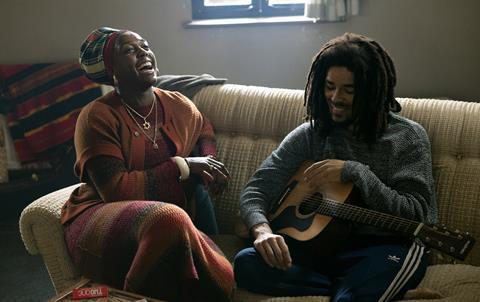Kingsley Ben-Adir portrays the iconic reggae musician in this underpowered biopic

Dir: Reinaldo Marcus Green. US. 2024. 105mins
Covering a crucial period in the late 1970s near the end of the influential reggae musician’s life, Bob Marley: One Love struggles to locate the man behind the legend. Kingsley Ben-Adir plays Marley as he survives an assassination attempt and leaves Kingston for London to clear his head and recharge his creative batteries, eventually creating his most beloved album Exodus. The central performance has a likeable, modest charm, and King Richard director Reinaldo Marcus Green resists the typical, unwieldy cradle-to-grave biopic narrative approach. Yet he fails to breathe much life into this underwhelming drama.
Lionises rather than illuminates
One Love opens on February 14 in the UK and US, competing with Marvel’s Madame Web for viewers. Ben-Adir offers some modest marquee appeal, as will blockbuster fixture Lashana Lynch. But Marley and his indelible songs of love and social consciousness are undoubtedly the main draw, with his family serving as producers and coming out in support of the show.
Taking place over the span of a few years, the film introduces us to Bob Marley (Ben-Adir) as he tries to unite his politically fractious Jamaican homeland, which is teetering towards civil war, with a free concert. But days before the performance, gunmen enter his home and start shooting, injuring Marley and his wife Rita (Lynch). Marley carries on with the concert but soon sends Rita and their children to America until national tensions decrease, and decamps to the UK with his band to start work on a new album.
Marley, who died in 1981 aged 36, drew on this turmoil and isolation to record Exodus, a masterpiece hailed for its lyrical directness and musical resilience. One Love can be viewed as a study in how this charismatic, spiritual artist channelled anguish into joy and commentary, cementing his legacy in the process.
Vividly shot by cinematographer Robert Elswit, the biopic sidesteps some of the genre’s most exasperating tendencies. The famous creative and business associates in Marley’s orbit come and go without fanfare, the film not stopping for lengthy introductions of every significant supporting player. (For instance, Chris Blackwell, the founder of his label Island Records and played by James Norton, is presented merely as ‘Chris’.) And the narrow focus of One Love avoids the predictable rise-then-fall plot construction familiar to music biopics with a larger scope.
But those pluses are negated by shortcomings elsewhere. Green, one of four writers credited on the screenplay, examines Marley’s tumultuous past through melodramatic flashbacks, providing a simplistic explanation for why this musician was so driven and so haunted. (According to the film, he never got over being abandoned by his white father.) In addition, One Love tries to do too much in its relatively short runtime, charting Marley’s making of Exodus, his growing friction with Rita (who is tired of his philandering) and the unexpected consequences of his escalating celebrity.
Each of these aspects of his life is potentially intriguing, but the film glosses over details rather than digging into them. (The same goes for Marley’s faith and his strained connection to his homeland when he is overseas.) The result is typical of too many music biopics, offering colourful highlights rather than sharp insights. How he birthed such powerful songs during such difficult times remains a mystery.
Ben-Adir’s singing voice is only occasionally heard but the actor, who played Malcolm X in One Night In Miami, once again demonstrates an ease in portraying an iconic figure. The Marley we meet in One Love is a flawed but decent man but although Ben-Adir nails his character’s distinctive patois, he cannot fully capture his electric stage presence or otherworldly manner. The film ends with footage of the actual Bob Marley, and the comparison hurts Ben-Adir, who is more comfortable conveying the singer’s gentle, searching demeanour.
Lynch is commanding as Rita, who loves her husband — and sings backup in his band — but fears that he is drifting away as he becomes more famous. Unfortunately, the character has been left underdeveloped, and so when Rita eventually confronts Marley, their argument feels oddly arbitrary. Essentially, the point of the scene is to inspire Marley to write one of his most enduring hits, ‘Redemption Song’, another example of One Love’s irritating dramatic simplifications.
This is especially frustrating as Bob Marley has long run the risk of becoming a bland totem — a heroic, groundbreaking and challenging musician reduced to an image on a poster hanging in a university dorm. Surely, One Love wants to give this titanic figure more dimensions, showing how his art was forged in pain, bringing inspiration and respite for so many listeners. But thanks to narrative short cuts and a lack of probing curiosity, the film lionises rather than illuminates.
Production companies: Plan B Entertainment, State Street Pictures, Tuff Gong Pictures
Worldwide distribution: Paramount Pictures
Producers: Robert Teitel, Dede Gardner, Jeremy Kleiner, Ziggy Marley, Rita Marley, Cedella Marley
Screenplay: Terence Winter & Frank E. Flowers and Zach Baylin & Reinaldo Marcus Green, story by Terence Winter & Frank E. Flowers
Cinematography: Robert Elswit
Production design: Chris Lowe
Editing: Pamela Martin, Nick Houy
Music: Kris Bowers
Main cast: Kingsley Ben-Adir, Lashana Lynch, James Norton, Tosin Cole, Umi Myers, Anthony Welsh, Nia Ashi, Ashton Barrett Jr
























